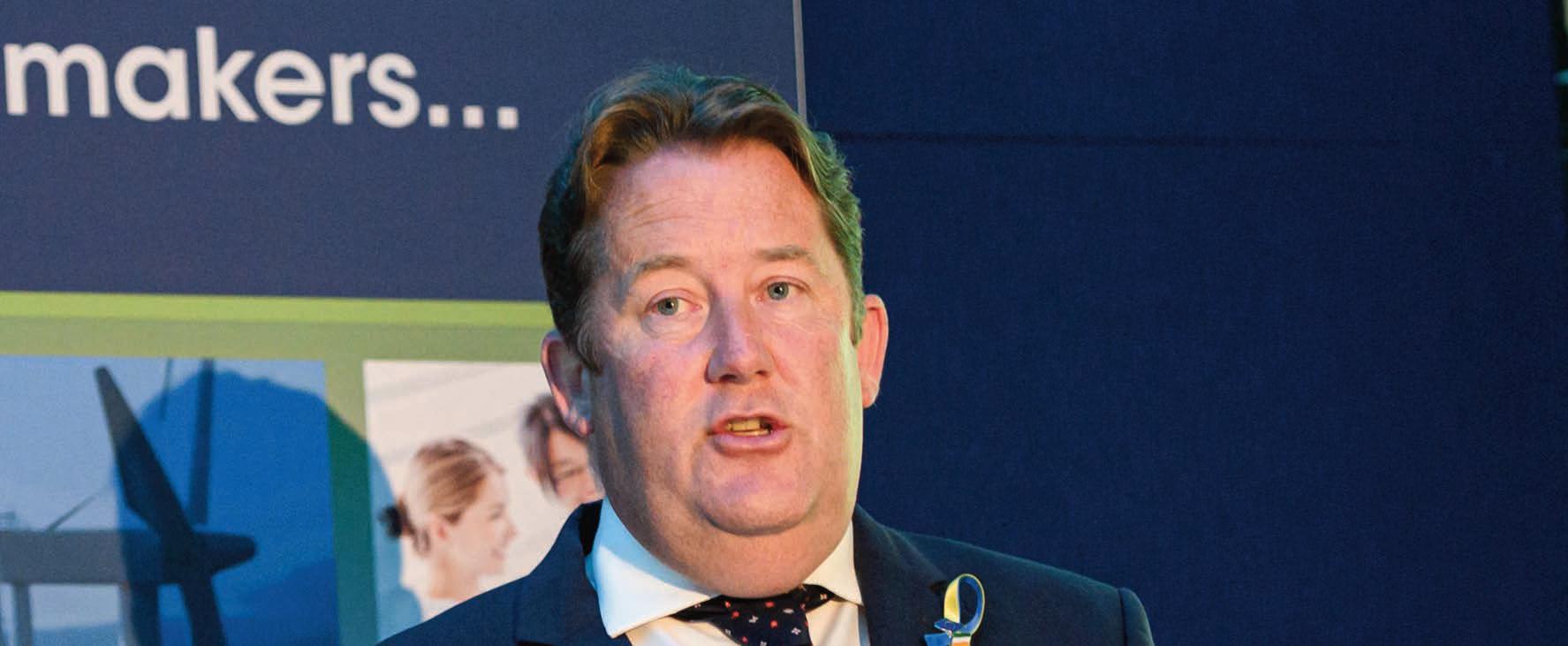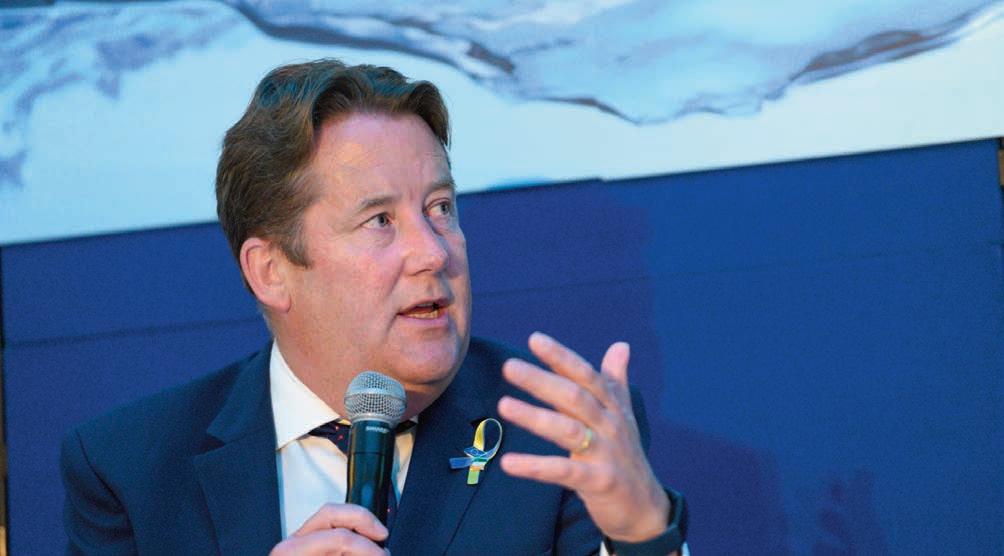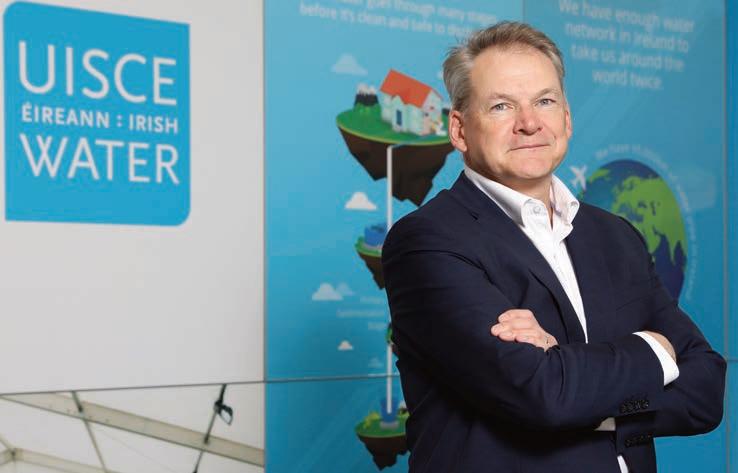
17 minute read
Minister Darragh O’Brien TD outlines priorities to improve water services


Minister Darragh O’Brien TD: Improving water services
“Substantial and sustained investment” from the Government and accommodating population growth are vital to ensure that Ireland’s water infrastructure deficits are addressed, according to Minister for Housing, Local Government and Heritage, Darragh O’Brien TD.
Many infrastructure projects throughout the State are dependent upon the transformation of water services, Minister O’Brien highlights. With plans to build over 300,000 new homes by the year 2030, the Minister outlines spending commitments which will transform the quality of water in Ireland:
“We have seen a very significant period of reform in the water sector in recent years, and we have also seen, through our National Development Plan, record investment in water services in the Republic.
“Our National Development Plan actually commits €6 billion between now and 2025. It is [Irish Water CEO] Niall Gleeson’s job to make sure that that is spent well, and we are getting the services and improvements we need. Importantly that capital is agreed, it is there on a multiannual basis and it ensures that we are able to plan projects into the future.”
Of that €6 billion, €4.5 billion is a commitment of exchequer funding for domestic water services in 2022. In the same period, Irish Water will spend close to €2 billion in operational and capital investment in water services.
Acknowledging that that the transformation has “been happening slowly,” but that it is “gathering pace”, the Minister points to the Programme for Government, which includes a commitment to retain Irish Water in public ownership, and to ensure that it is a “national, stand-alone utility, whilst ensuring that its sufficiently funded to fulfil its role”.
Transformation of water services
Minister O’Brien says that the goal of the Government is to ensure that Irish Water brings “greater coherence to how water services delivery is managed in an environmentally sustainable manner right across the country”.
Discussing the 2021 Water Sector Transformation Policy Paper, which “charts the course for completing the institutional reform programme by fully integrating water operations within the organisational structure of Irish Water,” the Minister also emphasises the goal of transformation of Irish Water into the single water utility as having the potential to create new jobs and training programmes.
The Minister acknowledged that the programme had been slowed down by the Covid-19 pandemic but added that he was “confident going forward that we will be able to agree on arrangements required and ensuring that any anxieties and concerns are allayed as we go through the process”.
Rural water services
Highlighting a “real problem in relation in rural growth” of water infrastructure, the Minister asserts that there is “a big challenge as we continue to improve and enhance water services right across the country”. As a result, the Minister announced a new €50 million targeted fund with the aim of, “targeting wastewater collection and treatment needs in villages and settlements without access to a public water services network”.
“What I really want to see with this is that some of our rural towns and villages who have not been able to access the capital programme who are longer down the road for that to happen but will use this as a pilot scheme,” he explains.
“The schemes that I want to see brought forward are the ones that are ready to go, where the local authorities have done the work, where the land is acquired, where the permissions are there, and the designs are done. After this, we will assess the applications which come through in September 2022 and move very quickly to approving them so that the local authorities will then tender for that work.”
The Minister indicated his frustration at the slow progress of updating water services for local communities in Ireland: “We have had a situation where we have had untreated wastewater going straight into the Avoca River. We have a €134 million plant that has been started that is being built and that is happening across the country.”
He continues: “All government departments are pointed towards that direction but the good thing, I suppose, is that it is centralised within my department and working, because local government is within my department as well.”
Considering the challenges, including planning permission, which have hindered efforts to improve rural water infrastructure, the Minister outlines that he plans to publish a “consolidated planning bill in the autumn,” with the aim of “positively impacting upon infrastructure developments, whilst also respecting the right for the public to make observations”.
“Communities are asking me why there is a situation that wastewater plants in towns and villages have not been upgraded or not been replaced. The place for 4


planning is not in the courts in my view. People can have recourse now where we have had cases go on further into Europe,” he says.
Protecting Ireland’s water resources
Meanwhile, states that his planned River Basin Management Plan, due to be published later in 2022, as the key framework to reversing the deterioration of water quality.
“The continued deterioration in the quality of our rivers and streams in Ireland is of real concern to us and we have to reverse that trend,” he insists.
Discussing the plan, the Minister provides an update on its progress: “Right now, we are reviewing over 1,400 submissions right across the 26 counties that were received during the public consultation.
“When that review happens, that will strengthen the plan and it will help us then to support and protect water. We are going to publish that later this year. What I want to see is a management plan, but it is going to be very action focused.
“It will require a lot more work for us to deliver but one of the concerns that I have is we are seeing a continued deterioration in our water, particularly in our inland water courses and in our rivers for many reasons.”
“We have got to start reversing that trend
and seeing improvements in that. That will happen through the addition of the provisional infrastructure that I have just discussed but also in relation to change of practices that we need to ensure happens.”
Emphasising the importance of clean water in developing Ireland’s overall infrastructure, he adds: “Clean water is vital to protecting public health, supporting economic growth and preserving our environment for future generations.”
Measures which he believes are essential to protecting Ireland’s water resources include reducing the loss of fertilisers and soil from farmland into inland water, reducing the physical impact on water caused by drainage activity, increasing the number of water barriers as well as investment from his department in urban and rural wastewater services.
Going forward
Looking to the future, Minister O’Brien outlines that “we need to proceed with enhanced investment in our water services, which our multi-annual investment provides for €6 billion”.
The Minister adds that the main challenge to ensuring progress for Irish Water is consolidating trust between all stakeholders. Acknowledging this challenge, he states that the Government will “be there to support change and to ensure that any commitments which are required by government are met in that space”.
He further states that the Government will monitor the progress on a weekly basis.
“We have an environment subcommittee within cabinet where the commitments in the Programme for Government are tracked as to how we are moving,” he concludes.
Sewage treatment in a circular economy
20° -50° Guadeloupe and Martinique Islands (FR)
60° -60° -40°
French Guiana (FR)
-30° -20° -10° 100° Svalbard (NO)
80°
30°
10° 20° 20° 30° 40°
Mayotte Island (FR)
50°
Reunion Island (FR)
50° 60° 60° 60 6 °
Waste water treatment plants equipped with disinfection, 2018 Chlorination UV disinfection Chlorination and ultraviolet (UV) radiation disinfection Ozonation or ozonation and other type of treatment No data Outside coverage
50°
Azores Islands (PT)
40°
40° -30° Madeira Island (PT)
-20°
30°
Canary Islands (ES)
30°
30° - 10°
Reference data: ©ESRI | ©EuroGeographics
0° 10° 0
20° 500
Note: UV. ultravoilet treatment Source: EEA (2022a).
30° 1,000
40°
30° 40°1,500 km
Achieving the transition to a circular economy requires change not only in regulatory and institutional approaches, but also in how citizens appreciate their individual and collective responsibilities towards sewage management, according to a report by the European Environment Agency (EEA).
The report, entitled Beyond water quality — Sewage treatment in a circular economy further outlines that: “A major barrier to achieving circularity lies in the persistent pollutants that can be discharged to or run off into urban wastewater, which then need to be removed and which may contaminate sewage sludge.” It further states that upstream measures are needed to keep pollutants out of wastewater, through restrictions, controls at source, and development of sustainable alternatives to the harmful substances currently in use, such as the recycling of sludge.
The report acknowledges that some water managers have already identified ways to become more energy efficient and reduce operational greenhouse gas emissions. Some urban wastewater treatment plants (UWWTPs) including one in Aarhus, Denmark, generate more energy than they use, through biogas generation and wastewater heat recovery. Some towns, operators and even countries have ambitious plans for net zero greenhouse gas emissions from the water sector, intensively reviewing their infrastructure and operations.
While large UWWTPs can deliver considerable efficiencies of scale, effective sewage treatment can also be achieved through local, decentralised facilities, ranging in scale from individual buildings up to small towns, such as the sewage treatment plant in Arklow, County Wicklow currently under construction.
Technologies such as separated wastewater systems enable sewage to be safely treated while recovering both energy and nutrients. Wastewater from washing and cooking can be reused for applications where lower quality water will suffice, such as irrigation of parks and gardens.
Alternative approaches to energyintensive treatment include the effective control of pollution at source and decentralised approaches that treat and dispose of relatively small volumes of wastewater. Furthermore, nature-based solutions such as constructed wetlands and reedbeds can provide flood resilience and green space for citizens in a cost-effective manner.
Achieving a circular economy in sewage treatment requires multiple stakeholders to participate, both in contributing solutions and in accepting change. At the infrastructure level of UWWTPs, towns and industry sectors, transition to more sustainable approaches may take time to become widespread, but already innovative towns, cities and utilities are finding solutions.


For Irish Water and its CEO Niall Gleeson, the coming years are set to bring significant change and exciting opportunities as the organisation progresses to become a national, standalone, regulated utility with full responsibility for the delivery of public water services in Ireland.
The recently published Water Services Amendment Bill creates the framework which will enable the legal separation of Irish Water from the Ervia group and follows the publication of the Framework for the Future Delivery of Water Services which provides for the voluntary transfer of local authority water services staff to Irish Water.
These two developments represent a generational shift in how public water services in Ireland are delivered, creating a national water services authority with the vision, resources and expertise to meet Ireland’s water and wastewater needs now and into the future.

While such an unprecedented organisational restructuring may seem daunting to many, for Gleeson managing change has been the one constant since he joined Irish Water in 2019, initially as Managing Director before being appointed CEO late in 2021. In his career as an engineer, he has worked on major infrastructure projects all over the world, from building power plants in Alaska to helping develop the Luas project in Dublin. He is relishing the opportunity to apply this expertise as he leads Irish Water into the next phase of its development.
“Irish Water is still a relatively young organisation, but it has undergone major changes and made huge progress, delivering significant benefits for Ireland,” he says.
“When Irish Water was set up there was a myriad of issues to be addressed as a result of decades of underinvestment in the water infrastructure: we had 50 towns and villages around Ireland where raw sewage was being discharged into the sea; there were thousands of people on long-term boil water notices; there were vastly differing procedures and charges for connecting to the water and wastewater network; and half of all treated water was being lost to leaks.

“Fast forward to 2022 and we have made huge progress in addressing many of those legacy issues. We have eliminated 60 per cent of all raw sewage discharges and are on track to end almost all the remainder by 2025; we have removed two million people from boil water notices, particularly long-term notices; working with the Commission for Regulation of Utilities (CRU) we have implemented standardised national charging regimes for connecting to the network and for non-domestic tariffs; and we are on track to reduce leakage to under 20 per cent in Dublin and 25 per cent nationally by 2030.
“I am confident that this track record, combined with the strong relationships we have built up with all of our stakeholders, will enable us to move forward successfully to the next stage on our journey to a single integrated public water services authority.”
Strong, strategic vision for the future
With plans in place to address these urgent legacy issues, Gleeson’s focus now is on the future and realising the vision of becoming a world class public water service focussed on customer needs, efficient water services, and supporting housing, economic development and job creation across the country.
4

Niall Gleeson, Irish water
“We all know that good water infrastructure underpins economic growth and development. Our priority now is to build an organisation and an infrastructure that is fit for purpose to meet the country’s needs, while also enhancing the environment and safeguarding our precious water resources,” he says.
“Housing is a key priority for everyone and we recognise that we have an important role to play in enabling the delivery of new homes around the country. We have already delivered huge improvements in supporting water and wastewater connections by establishing a single national connections process that is fair and equitable for all applicants, irrespective of where they are in the country. We have grown our connection and developer services team to enable us to deliver a high-quality service to home builders and developers and we have also published water and wastewater capacity registers on https://www.water.ie/connections/developerservices/capacity-registers/. These registers provide guidance to developers and planners on which areas have capacity for growth.
“We recently launched new initiatives such as the self-lay in public roads and the experience-based contractor accreditation schemes to facilitate the development of water services infrastructure by contractors and to streamline the delivery of connections. All these initiatives are having a real impact; last year alone Irish Water approved connections for over 32,000 houses.
“We recognise that there is even further scope for improvement and we are constantly engaging with government, and with the construction sector and industry bodies such as the Construction Industry Federation (CIF) to find solutions to enable more efficient delivery of housing, while also making sure that the water services infrastructure meets the appropriate levels of quality and standards to avoid future issues for customers.”
Planning for a sustainable future
Ireland’s population is growing, and Irish Water must keep pace while also meeting the expectations of the public and its stakeholders. Gleeson points out that while water quality overall has improved, many supplies remain vulnerable due to the age and fragmented nature of the existing infrastructure.
“The most recent Census and forecasting on population growth tells us we will need 40 per cent more water by 2050 than we supply today. We have developed the first National Water Resources Plan (NWRP) to enable us to strategically and proactively plan for the country’s needs over the next 25 years and beyond. It will enable us to develop safe, secure, reliable, and sustainable public water supplies for all of our customers and communities, whilst safeguarding public health and the environment.”
An integrated national framework for the delivery of water services
The Framework for the Future Delivery of Water Services published by Minister for Housing, Local Government and Heritage, Darragh O’Brien TD, in June 2022, established the conditions by which over 3,000 local authority workers will be offered the option of becoming Irish Water staff. The CEO is confident that the agreement provides a strong incentive for staff choosing to join Irish Water.
“I believe Irish Water is a great place to work, where staff can make a real contribution to the development and improvement of communities all over Ireland. We have a great story to tell, and I believe that all water services workers in local authorities can become an integral part of our future.
“For the first time in Ireland, there is a coherent and ambitious vision for the delivery of water services at a national level. There is a place in Irish Water for all water services staff currently working in the local authorities, and we are ready to welcome everyone who chooses to join us.”

The challenge of delivering infrastructure
Gleeson acknowledges that, in the past, Irish Water has been overly optimistic in its projected timelines for some of its projects and that issues in getting planning permission, land acquisition, and other statutory consents have led to delays.
“Generally, once we break ground on projects we have a very good track record in delivering on time and within budget. However, lengthy decision-making timelines, and the uncertainty around when decisions will be made, make it very difficult to deliver strategic projects and provide certainty for the delivery of our investment plan and National Development Plan objectives,” he explains.
The lengthy process of acquiring land for developments can also add to delays in project delivery timelines.

“It is very unsatisfactory for us and our stakeholders, particularly land-owners, decision makers, and everyone relying on our investment programme to deliver national objectives, such as Housing for All.”
These processes need to be streamlined and aligned, he says, adding that he welcomed the reforms to the planning process currently being proposed as part of the Planning and Development Bill.
Continued high levels of investment
Planning challenges notwithstanding, Irish Water has made significant strides in the delivery of critical infrastructure nationwide. Major projects completed in the last year alone include the Cork Lower Harbour Main Drainage Project, the Vartry Water Supply Scheme, and the covered reservoir in Stillorgan.
“We have proven that, with the right levels of funding, we can deliver for the benefit of everyone in Ireland. We have identified our priorities for capital investment in line with the Government’s Water Services Policy Statement and Project Ireland 2040. We have also made an updated submission for the recast National Development Plan 2021-2030 which includes a nearly €6 billion commitment to public water services to 2025.
“While we are focusing on delivering our current investment plan, we are also preparing for the next five-year plan and working on the development of a revised Water Services Strategic Plan in line with the new River Basin Management Plan and with Housing for All. There is no doubt that there are challenges ahead – construction inflation, and supply chain issues in particular – but we are determined to work with our expert staff, government, our regulators and our suppliers to continue to deliver the high level of investment and infrastructure delivery that will be essential to Ireland’s future.”
W: water.ie S: linkedin.com/in/niallgleeson










